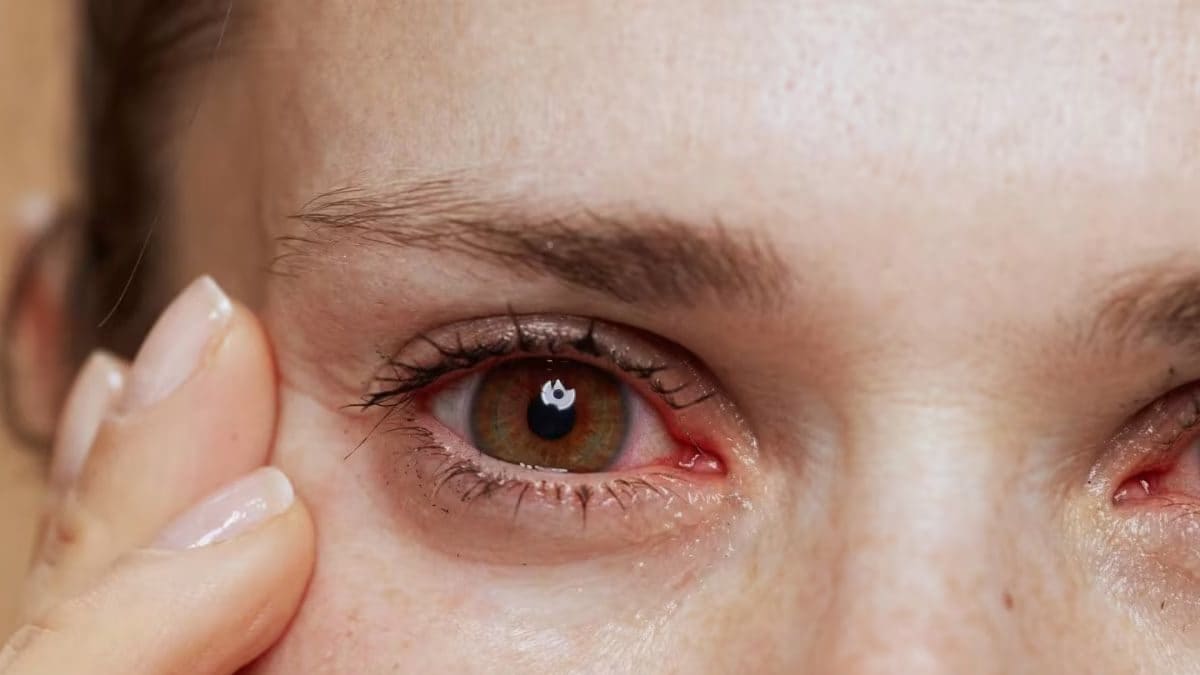Last Updated:
When a person suffers from this issue, their eyes do not make enough tears or have enough moisture to be healthy and function properly.

You can effectively manage dry, irritated eyes caused by pollution and enjoy clearer, more comfortable vision with these tips
Pollution can take a toll on our eyes, causing dryness, irritation, and discomfort. With the increasing level of pollution during the festive season, dry eyes have become increasingly common, particularly in urban areas. When a person suffers from this issue, their eyes do not make enough tears. This increasingly common problem is caused by a variety of reasons that disrupt the healthy tear film. A human’s tear film has three layers: fatty oils, aqueous fluid and mucus, which keep the surface of the eyes lubricated, smooth and clear. Damage to any of these layers can be very uncomfortable, particularly when you want to sleep.
“Pollution contributes to dry eyes and eye irritation through various mechanisms. Particulate matter, which comprises tiny particles suspended in the air, can adhere to the tear film, causing instability and increased evaporation. This leads to dryness and irritation. Moreover, pollutants can trigger allergic reactions, exacerbating symptoms for individuals with pre-existing conditions such as allergic conjunctivitis,” consultant ophthalmologist at Dr Agarwals Eye Hospital, Dr Mubashir Parkar, said, as per The Times of India.
With the festive season in full swing, let’s see the symptoms and preventive measures that can help manage and alleviate these discomforts effectively.
Symptoms of Dry Eyes
- Stinging, burning, or scratchy sensation in your eyes
- Stringy mucus in or around your eyes
- Sensitivity to light
- Eye redness
- A sensation of having something in your eyes
- Difficulty wearing contact lenses
- Difficulty with nighttime driving
- Watery eyes, which is the body’s response to the irritation of dry eyes
- Blurred vision or eye fatigue
How to keep your eyes cool and healthy
Here are some tips that you can follow to soothe your eyes and alleviate discomfort caused by pollution:
- Artificial TearsUse lubricating eye drops that wash away irritants and provide relief from dryness while keeping your eyes moist.
- Stay HydratedAnother reason that could lead to dry eyes is dehydration. Hence, it is advised to drink plenty of water throughout the day to maintain overall hydration, which also keeps your eyes moisturised.
- Limit Screen TimeOur phone or laptop screens put immense pressure on our eyes. Hence, try reducing exposure to digital screens, especially during peak pollution hours. Also, practice the 20-20-20 rule. After every 20 minutes of screen time, take a 20-second break and focus your eyes on an object at least 20 feet away to relax your eyes to prevent dryness.
- Wear Protective EyewearWear sunglasses with UV protection to shield your eyes from harmful UV rays and pollutants. Consider wearing protective goggles or masks in heavily polluted areas to reduce direct exposure to airborne particles.
- Clean Your Eyes RegularlyWash your eyes with clean water every time you step out to remove pollutants. Moreover, avoid rubbing your eyes excessively, as it can further irritate them.
- Eat healthyAim to consume food rich in omega-3s like those in fish oil or flaxseed oil. Omega-3s have been linked to improve eye moisture and may help combat dry eye symptoms.
- Remove Contacts Before SleepingIf your contact lenses are not designed for overnight use, do not forget to remove them before going to bed. Also, if you remove them earlier, it can give your eyes enough time to breathe.
- Blink frequentlyThe easiest way to prevent dry eyes is by blinking frequently. It helps to keep the eyes moist and can prevent dryness, especially during prolonged screen time.If your eye irritation persists or worsens, consult an eye doctor for professional advice and treatment. By following these tips, you can effectively manage dry, irritated eyes caused by pollution and enjoy clearer, more comfortable vision.


